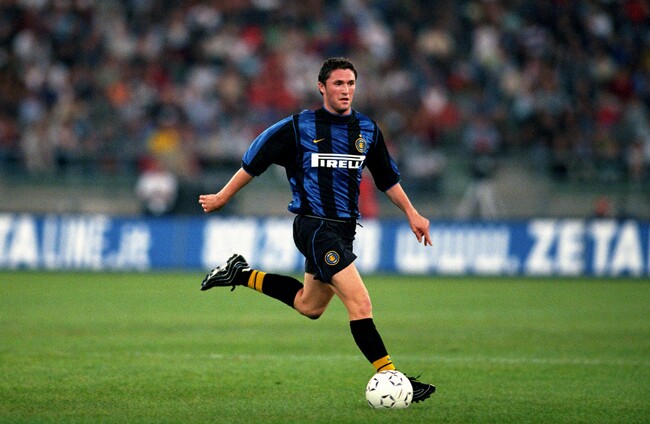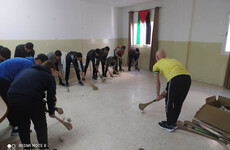IT WAS A bright August afternoon at Carrow Road nineteen years ago when Robbie Keane grabbed a stunning brace on his professional debut for Wolves.
Two years later, he scored twice on his first appearance for Coventry after his record-breaking transfer from Molineux.
It all seemed pretty easy.
But then, twelve months later, Keane was in Milan and found the going a lot tougher.
Put into a modern context, it’s hard to find a suitable comparison. Keane, a raw but exciting talent, was just 20 years old. He had been a Premier League player for just one season.
And in the summer of 2000, he signed for a club that had broken the world transfer record twice between 1997 and 1999 to sign Ronaldo and Christian Vieri respectively.
Keane was walking into an Inter Milan dressing-room that featured a litany of high-profile names: Javier Zanetti, Laurent Blanc, Clarence Seedorf.
Marcelo Lippi had been brought in as the club’s manager the year before, after leading Juventus to three league titles, a Champions League and Coppa Italia in his five years there.
It was a long way from Noel Whelan, John Aloisi and Gordon Strachan back at Highfield Road.
Inevitably, there were plenty who had reservations.
Brian Kerr knew Keane well but questioned the wisdom of the move to Serie A.
“There’s definitely the question of whether it’s too soon but who knows if another opportunity will come along like this one?” he said.
Liam Brady, who had played in Italy for seven years, was more optimistic but was wary of the effect being a substitute would have on Keane.
I think it’s a great move for him,” he said.
The only downside is that he’s going into a situation where he won’t be an automatic choice. He’ll have to contend with three or four top-class strikers.”
Keane had been signed on a five-year deal for £13m but as much as he had been a record-breaker in England, he was unknown in Italy.
Still, he had a fan in Lippi.
“At that time at Inter, they had a policy of going for young players and Robbie Keane was the best one that I saw”, Lippi said later.
“He had good technique and he was a good striker”.
He was handed a competitive debut in a Champions League qualifier against Helsingborg in Sweden.
Inter were without a collection of costly attacking talent. Ronaldo, Vieri and mercurial but inconsistent Uruguayan Alvaro Recoba were all injured. Ivan Zamarano also wasn’t fully fit.
Keane started up front alongside legendary Turkish striker Hakan Sukur – another summer signing. Blanc, Vladimir Jugovic and Andrea Pirlo were all selected too while Seedorf came on as a second-half substitute.
Inter lost. But Keane’s performance was praised. He chatted to La Gazzetta dello Sport a few days later and looked back on his first performance for the Nerrazzurri.
“It all happened so fast that it seems [like] a dream”, he said.
“I’m happy. It is wonderful to be an Inter player and [participate] in a competition that so far I had only seen on television.”
For the second-leg, Keane started on the bench alongside the likes of Recoba and Luigi Di Biagio. He was brought on at half-time but Inter were frustrated in their attempts to level the tie.
Then, in the dying minutes, they won a penalty. Recoba stepped up and missed. Inter were out and Lippi, already, was under pressure.
On the first day of the league season, Inter lost again – this time to lowly Reggina. Lippi called the players ‘spoiled children’ afterwards and accused them of having lost faith in him.
Keane anxiously waited for the fall-out. There was some respite when he headed to Amsterdam with the Irish team and scored in a 2-2 draw with the Netherlands.
And there was a first goal for the club too. In the Super Cup clash with Lazio, he scored after just three minutes with a delightful, cushioned lob over the on-rushing Angelo Peruzzi but Inter eventually lost 4-3. Still, he scored again in a 3-0 Uefa Cup win over Ruch Chorzow shortly after.
But, three days into October and Lippi was gone, sacked by club president Massimo Moratti.
A difficult environment had just a lot harder for Keane.
Marco Tardelli was Lippi’s replacement and after failing to score a goal in the top-flight, it was getting harder to justify Keane’s role in the side. But, he was also playing in an unfamiliar role, off the shoulder of the main attacker – something he’d never done before.
It was tough to readjust and he quickly found himself on the bench. It was an unfamiliar and unsettling feeling for a relentless wired, unstoppable youngster.
Keane had never even played reserve football before. From the age of 18, he had been first-choice for club and country.
“I was probably too young when I went”, he admitted years later.
“If I’d gone later it would have suited me playing in that hole. But do I regret it? I honestly don’t. It was an unbelievable experience people ask me about, living there, learning the language, playing in Italy. It was a good learning curve for me to understand the game for when I came back.
I wanted to come back. Every club if I am not playing, I leave because I want to play football. All I wanted to do since I was a kid is play football and if I wasn’t at a club I’d be playing with my mates on a Sunday. I still come home and play five-a-side with my mates.
I get paid to play football, not to sit on the bench, I don’t enjoy that. Over the years loads of players have been very happy to do that and pick up their money. That used to really wind me up.
It would get to a point where I’d say enough is enough. For me preparing during the week for a weekend is what it is all about.”
Throughout the autumn, Keane was linked with a move away from the San Siro. He had the chance to stay in the league when Reggina inquired about taking him on loan but he eventually headed to Leeds United on temporary deal.
After 13 appearances, four goals and a total of 739 minutes, Keane’s Inter career was over.
It proved a smart swap too as the club reached the final four of the Champions League. He made the move permanent at the end of the campaign before signing for Tottenham in 2002.
While there, he scored over a hundred goals. His form caught the attention of a familiar face: the Inter president Moratti.
“I admit Robbie Keane is a big regret,” he said.
“The other day, I was watching him play for Tottenham on the television. He had a perfect game. He had a thousand touches and not one mistake. It drives me mad! It was my choice to bring him to Inter. I liked him as a player, but he didn’t shine with us.
And now look at him!”
The42 is on Snapchat! Tap the button below on your phone to add!

















Didnt Robbie try to back heel a goal in that champions league tie and fluff it